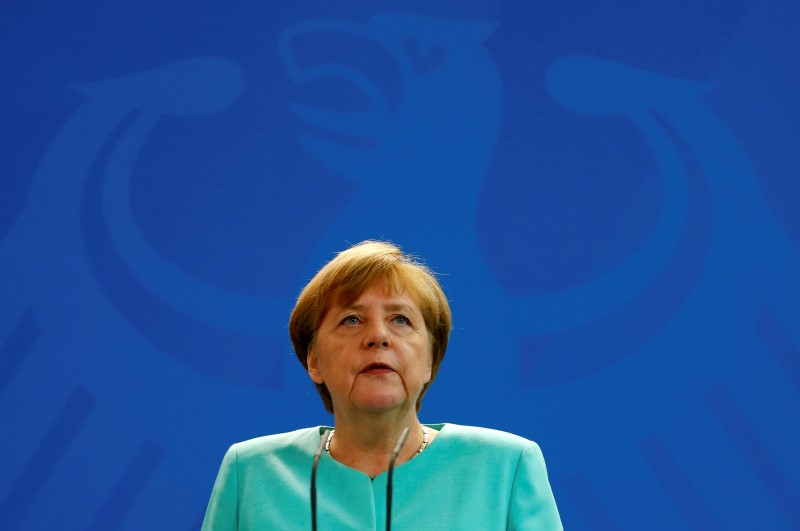By Noah Barkin and Andreas Rinke
PARIS/BERLIN (Reuters) - Germany and France agree on one thing: that Europe must change following the shock of last week's Brexit referendum.
But after years of economic and political crisis in Europe that have left deep scars in Berlin and Paris, there appears to be little agreement between the bloc's top two powers about what kind of change is needed and how fast it should come.
That suggests that the Franco-German engine that has powered the EU for decades may struggle to deliver the change many European officials feel is necessary to win back the support of citizens, fight off a right-wing populist surge and avert a gradual disintegration of the bloc.
Over the weekend, as Europe began digesting the prospect of an EU without Britain, a cacophony of conflicting signals were being sent out by politicians on either side of the Rhine, despite a joint paper by the German and French foreign ministers meant to minimise the differences and highlight common ground.
The most obvious and immediate divide is over how to treat Britain in the immediate aftermath of the vote.
At a meeting of Chancellor Angela Merkel's conservatives south of Berlin, she and her aides made clear that they were ready to give Britain the time it needs to sort through its political mess before starting talks on the terms of a Brexit.
Some officials in Berlin may even be hoping that the referendum could be reversed. Regardless, their priority is to prevent an acrimonious rupture with London.
"Of course the EU has the means to pressure Britain but we shouldn't focus on that," one senior German official told Reuters. "They need the time to realise what they've done. There is no need for threats or pressure at the moment."
French politicians from across the political spectrum are sending a different message. They have made clear in recent days that a quick divorce is necessary. Some are describing Brexit as an opportunity for France to reassert its leadership in the EU.
"There can be no cat and mouse game," French Foreign Minister Jean-Marc Ayrault said.
DIVERGING PRIORITIES
Beyond the question of how quickly Brexit talks should start, Germany and France remain deeply divided over how to reform Europe, beyond the notion that something must be done to remind sceptical populations of Europe's purpose.
Merkel will meet with Hollande in Paris on Monday, along with European Council President Donald Tusk and Italian Prime Minister Matteo Renzi, to try to forge a common message before an EU summit on Tuesday and Wednesday.
The ever-cautious Merkel told members of her conservative party at the weekend that she saw no need for a radical reinvention of the European Union in the wake of the Brexit vote. Instead, she said, Europe should take time to reflect and work patiently to address its flaws.
For the Germans, there are two main priorities for Europe: agreeing a fair mechanism for distributing refugees across the bloc and pressing ahead with structural reforms in economically weak countries to improve long-term growth prospects.
The French are in a different place. Unlike Merkel, who seems on track to win a fourth term next year, President Francois Hollande is politically weak and, if he runs at all, seems unlikely to make it into the second round of the French election next spring.
His government faces a major challenge from the far-right National Front. It is battling protests against its labour market reforms. And the country remains in a state of emergency following attacks by Islamic militants last November which killed 130 people in Paris.
"The Franco-German couple no longer exists as far as I'm concerned, not because of who is in power, but because we no longer have any credibility with the Germans," said former French Prime Minister Francois Fillon on Sunday.
"It will be very difficult for Francois Hollande to launch a new European initiative. You need credibility to do that."
That hasn't prevented Hollande and his Prime Minister Manuel Valls from talking about the need to move fast to "reinvent" Europe.
Their vision however, elements of which can be found in the joint paper from Ayrault and German Foreign Minister Frank-Walter Steinmeier, is one that prioritises security on the one hand and a more "social" Europe on the other.
This vision is shared by Germany's Social Democrats (SPD). SPD leader Sigmar Gabriel and his party colleague Martin Schulz, the president of the European parliament, issued a separate paper at the weekend which called for a major shift in economic priorities in Europe, away from fiscal discipline towards more pro-growth policies.
But Merkel's conservative allies are having none of it.

"The Socialists want German taxpayers to subsidise countries that aren't reforming," one senior ally told Reuters. "This would be a catastrophe."